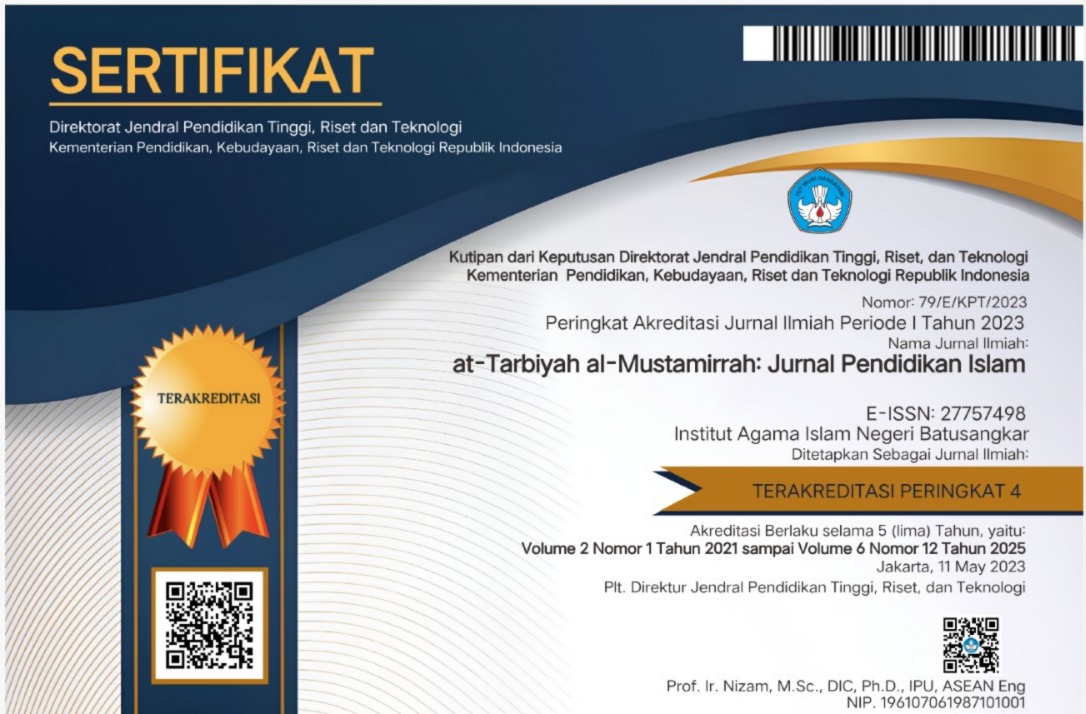Pemikiran Muhammad Iqbal : Pengaruh rekonstruksi pendidikan Islam pada dunia Pendidikan tinjauan filosofis antropologis
DOI:
https://doi.org/10.31958/atjpi.v3i2.6031Keywords:
pemikiran, Muhammad Iqbal, KhudiAbstract
According to Iqbal's views on Islamic education, people should have the most freedom to move around and express their creativity in order to develop academically, physically, and intuitively. This paper aims to show how Muhammad Iqbal's ideas on Islamic education were reconstructed using an anthropological philosophical analysis. The research methodology used was a review of the existing literature, and the principal sources were the idea of Muhammad Iqbal's thinking and various works regarding Iqbal's thoughts. The Reconstructions of Religious Thought in Islam by Muhammad Iqbal serves as the primary source for this study. The study's findings demonstrated that reconstructing Muhammad Iqbal's educational philosophy on Islamic education in anthropological philosophy has the impact of revealing that people have "Khudi," also known as the ego, which is the human self made up of spirit, heart, soul, and body. These four ÔÇ£KhudiÔÇØ are taken into account when putting education into practice. The integration of modern and Islamic education is greatly aided through ÔÇ£KhudiÔÇØ. This implies that Islamic education must include scientific truths as well as discussions of Islamic science. On the other hand, Islamic science must be discussed in general education. Islamic education will improve and become more developed as a result of the integration of the ÔÇ£KhudiÔÇØ potential that humans possess.
References
Bahr, S. (2018). Metode Penelitian Bisnis Lengkap dengan Teknik Pengolahan Data SPSS. Yogyakarta: andi.
Hasan, I. (2004). Analisis Data Penelitian dan Statistik. Jakarta: Bumi Aksara.
Sugiyono. (2013). Metode Penelitian Kuantitatif, Kualitatif dan R & D. Bandung: Alfabeta.
Teguh, M. (2005). Metode Penelitian Ekonomabangi Teori dan Aplikasi. Jakarta: Raja Grafindo Persada.
Andespa, Roni. (2017) “Faktor-faktor yang Mempengaruhi Minat Nasabah dalam Menabung di bank Syariah” (Jurnal lembaga Keuangan dan Perbankan, Volume 2, Nomor 1.
Aurefanda, Vino.(2019) “Pengaruh Pengetahuan Mahasiswa Tentang Bank Syariah Terhadap Minat Menabung Di Bank Syariah” (Skripsi, Pascasarjana UIN AR-Raniry Banda Aceh).
Bahri, Saiful.(2018) Metode Penelitian Bisnis Lengkap dengan Teknik Pengolahan Data SPSS. Yogyakarta.
Churiyah, Madziatul.(2011) Ekonomi Syariah. Jawa Timur: Surya Pena Gemilang.
Darmawi, Herman.(2012) Manajemen Perbankan. Jakarta: PT Bumi Aksara, Cet.1, 2011, Cet.2.
Dayyan, Muhammad. “Analisis Pemahaman Masyarakat Mengenai Perbankan Syariah Terhadap Minat Menabung”. Jurnal Ilmiah Mahasiswa (JIM) Vol 1, No 1, Tahun 2017.
Downloads
Published
Issue
Section
License
Copyright (c) 2022 M Iqbal Lubis, Munzir Hitami, Alpizar Alpizar

This work is licensed under a Creative Commons Attribution-NonCommercial 4.0 International License.
Authors who publish with this journal agree to the following terms:
- Authors retain copyright and grant the journal right of first publication with the work simultaneously licensed under a?á?áCreative Commons?áAttribution-NonCommercial 4.0 International.that allows others to share the work with an acknowledgement of the work's authorship and initial publication in this journal.
- Authors are able to enter into separate, additional contractual arrangements for the non-exclusive distribution of the journal's published version of the work (e.g., post it to an institutional repository or publish it in a book), with an acknowledgement of its initial publication in this journal.
- Authors are permitted and encouraged to post their work online (e.g., in institutional repositories or on their website) prior to and during the submission process, as it can lead to productive exchanges, as well as earlier and greater citation of published work.








